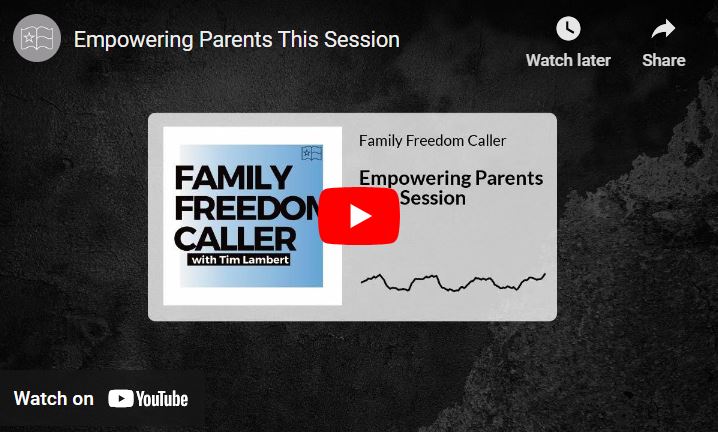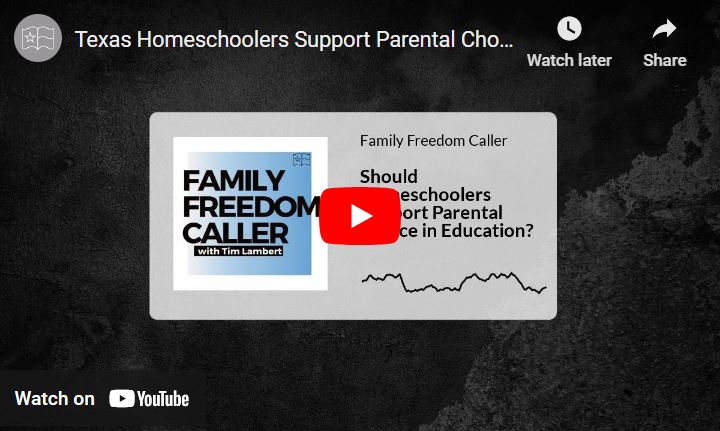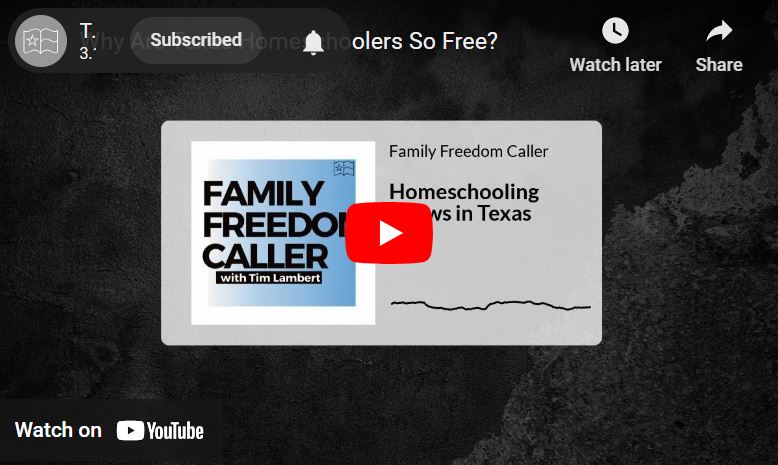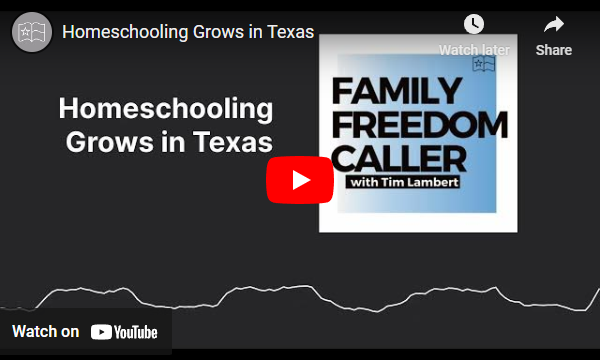As you view this, we are one week away from election day. I have talked about this…a lot! It is important.
For the last decade or so, winners of national elections have often pointed out that “elections have consequences,” and those who win set the agenda for the future at the local, state, and national levels.
That fact is critically true for the issue of children and families in Texas and across the country. Today more than ever before, parents and families are under attack at the federal, state, and local levels.
The fundamental, God-given right of parents to raise their children as they see fit is under assault in this country and in our state.
Many groups, including THSC, are actively involved in vetting candidates and endorsing those who support families, children, and parental rights.
However, there are many races for which you may not have any information as you go to vote except for the political party of the candidate. How do you make that decision?
Let me give you my personal approach. The political party affiliation gives you some information about the candidate.
- The Green Party is left of center and is focused on environmental issues, and is often seen as a party that draws votes from the Democratic candidate.
- The Libertarian Party is right of center and focused on individual freedoms including things such as the legalization of drugs. It is often seen as taking votes from Republican candidates.
- The Democratic Party is heavily influences by the teachers’ unions, who oppose parental choice in many cases. The party supports the issues such as gender transition, abortion (some even up to point of birth), and it opposes efforts to give families more choices in education.
- The Republican Party explicitly supports parental rights and expanding the choices families in Texas have for the education of their children, as well as the sanctity of life.
The Green Party and the Libertarian Party are “third parties.” That is, they are not one of the two major parties. The Democratic and Republican parties often seek to remove the third parties from the ballot through legal action because each will siphon votes from the major parties and, in a close race, can take enough votes to move the election.
I have heard it said that in the primary season when political parties choose their candidate, one should “vote their heart,” but in the general election that they should make the best choice between the two major parties.
Another way to say this is that in the general election, the choice is really a binary one between the Republicans and the Democrats.
With that in mind, my personal opinion is that we should make that choice based on which of the major political parties is closest to our personal views. Sometimes this view is criticized as a “choice between the lesser of two evils.” However, we are faced with decisions all the time in life in which we have no “perfect” choice but have to make a decision on what is best between two choices that are not what we want.
With my view of voting for the candidates that will best represent the God-given right of families to raise their children as they see fit, I will personally be voting next week for every Republican on my ballot because that is, in my opinion, the best choice for protecting the families of Texas.
How do we choose in “non-partisan” races like school board elections? The best way is to find someone with your values that you know and trust and who has a good recommendation. Another way is to follow groups like iVoterguide.com, the 1776Project Pac, and even some local Republican Parties who are endorsing local school board candidates.
Whatever you do, go vote because elections have consequences!
Please vote now during early voting. Check out THSC’s endorsements and go to iVoterguide.com for information on other races outside of THSC’s endorsement list. This is the most important election!
Help us in our mission of not only Keeping Texas Families Free but in keeping you updated as to all the latest news on the legislative front.
If you agree with us and support our mission to support parents, join THSC or become a supporter and help us stand in the gap for the families of Texas.
Subscribe to our newsletters to receive important updates.
Tim Lambert, THSC President
Tim Lambert, has been the president of the Texas Home School Coalition since 1990 and involved in homeschool leadership since 1984. He and his wife Lyndsay taught their four now-grown children at home for 16 years, graduating the last two in 2000. As the head of the organization for the leading home school state in the country, he is recognized as an authority on home education issues.
Tim has testified before numerous Texas legislative committees on issues related to homeschooling and often deals with state government agencies, including the Texas Education Agency and the Texas Department of Family and Protective Services. He has also addressed such conferences as the Texas Association of Collegiate Registrars and Admissions Officers on the topic. He holds a B.A. in political science from Texas Tech University and is active in the political arena, serving eight years as Republican National Committeeman for Texas. Tim is committed to serving the homeschooling community and to protecting parents’ right to choose the method of education of their children.
As you view this, we are one week away from election day. I have talked about this…a lot! It is important.
For the last decade or so, winners of national elections have often pointed out that “elections have consequences,” and those who win set the agenda for the future at the local, state, and national levels.
That fact is critically true for the issue of children and families in Texas and across the country. Today more than ever before, parents and families are under attack at the federal, state, and local levels.
The fundamental, God-given right of parents to raise their children as they see fit is under assault in this country and in our state.
Many groups, including THSC, are actively involved in vetting candidates and endorsing those who support families, children, and parental rights.
However, there are many races for which you may not have any information as you go to vote except for the political party of the candidate. How do you make that decision?
Let me give you my personal approach. The political party affiliation gives you some information about the candidate.
- The Green Party is left of center and is focused on environmental issues, and is often seen as a party that draws votes from the Democratic candidate.
- The Libertarian Party is right of center and focused on individual freedoms including things such as the legalization of drugs. It is often seen as taking votes from Republican candidates.
- The Democratic Party is heavily influences by the teachers’ unions, who oppose parental choice in many cases. The party supports the issues such as gender transition, abortion (some even up to point of birth), and it opposes efforts to give families more choices in education.
- The Republican Party explicitly supports parental rights and expanding the choices families in Texas have for the education of their children, as well as the sanctity of life.
The Green Party and the Libertarian Party are “third parties.” That is, they are not one of the two major parties. The Democratic and Republican parties often seek to remove the third parties from the ballot through legal action because each will siphon votes from the major parties and, in a close race, can take enough votes to move the election.
I have heard it said that in the primary season when political parties choose their candidate, one should “vote their heart,” but in the general election that they should make the best choice between the two major parties.
Another way to say this is that in the general election, the choice is really a binary one between the Republicans and the Democrats.
With that in mind, my personal opinion is that we should make that choice based on which of the major political parties is closest to our personal views. Sometimes this view is criticized as a “choice between the lesser of two evils.” However, we are faced with decisions all the time in life in which we have no “perfect” choice but have to make a decision on what is best between two choices that are not what we want.
With my view of voting for the candidates that will best represent the God-given right of families to raise their children as they see fit, I will personally be voting next week for every Republican on my ballot because that is, in my opinion, the best choice for protecting the families of Texas.
How do we choose in “non-partisan” races like school board elections? The best way is to find someone with your values that you know and trust and who has a good recommendation. Another way is to follow groups like iVoterguide.com, the 1776Project Pac, and even some local Republican Parties who are endorsing local school board candidates.
Whatever you do, go vote because elections have consequences!
Please vote now during early voting. Check out THSC’s endorsements and go to iVoterguide.com for information on other races outside of THSC’s endorsement list. This is the most important election!
Help us in our mission of not only Keeping Texas Families Free but in keeping you updated as to all the latest news on the legislative front.
If you agree with us and support our mission to support parents, join THSC or become a supporter and help us stand in the gap for the families of Texas.
Subscribe to our newsletters to receive important updates.
Tim Lambert, THSC President
Tim Lambert, has been the president of the Texas Home School Coalition since 1990 and involved in homeschool leadership since 1984. He and his wife Lyndsay taught their four now-grown children at home for 16 years, graduating the last two in 2000. As the head of the organization for the leading home school state in the country, he is recognized as an authority on home education issues.
Tim has testified before numerous Texas legislative committees on issues related to homeschooling and often deals with state government agencies, including the Texas Education Agency and the Texas Department of Family and Protective Services. He has also addressed such conferences as the Texas Association of Collegiate Registrars and Admissions Officers on the topic. He holds a B.A. in political science from Texas Tech University and is active in the political arena, serving eight years as Republican National Committeeman for Texas. Tim is committed to serving the homeschooling community and to protecting parents’ right to choose the method of education of their children.











